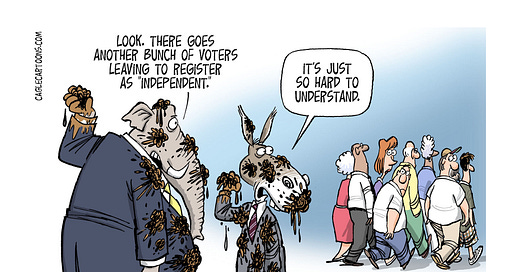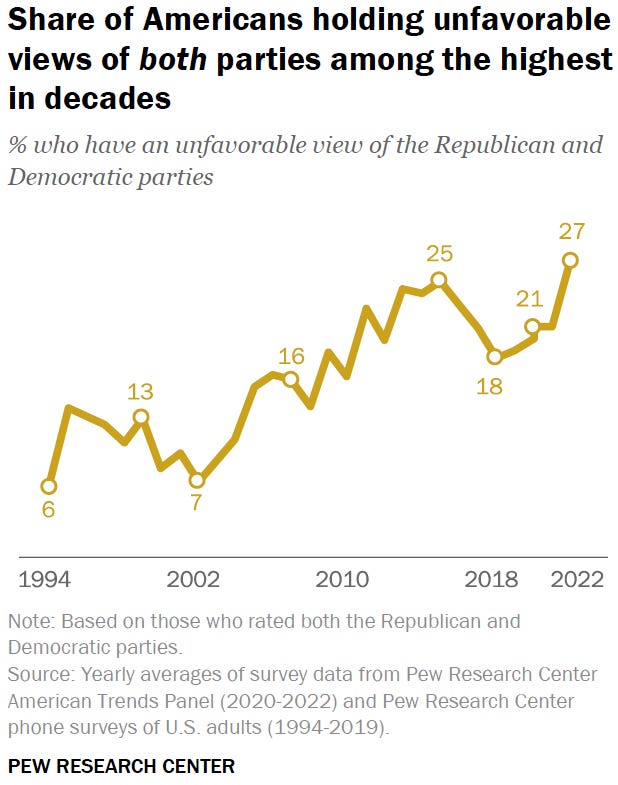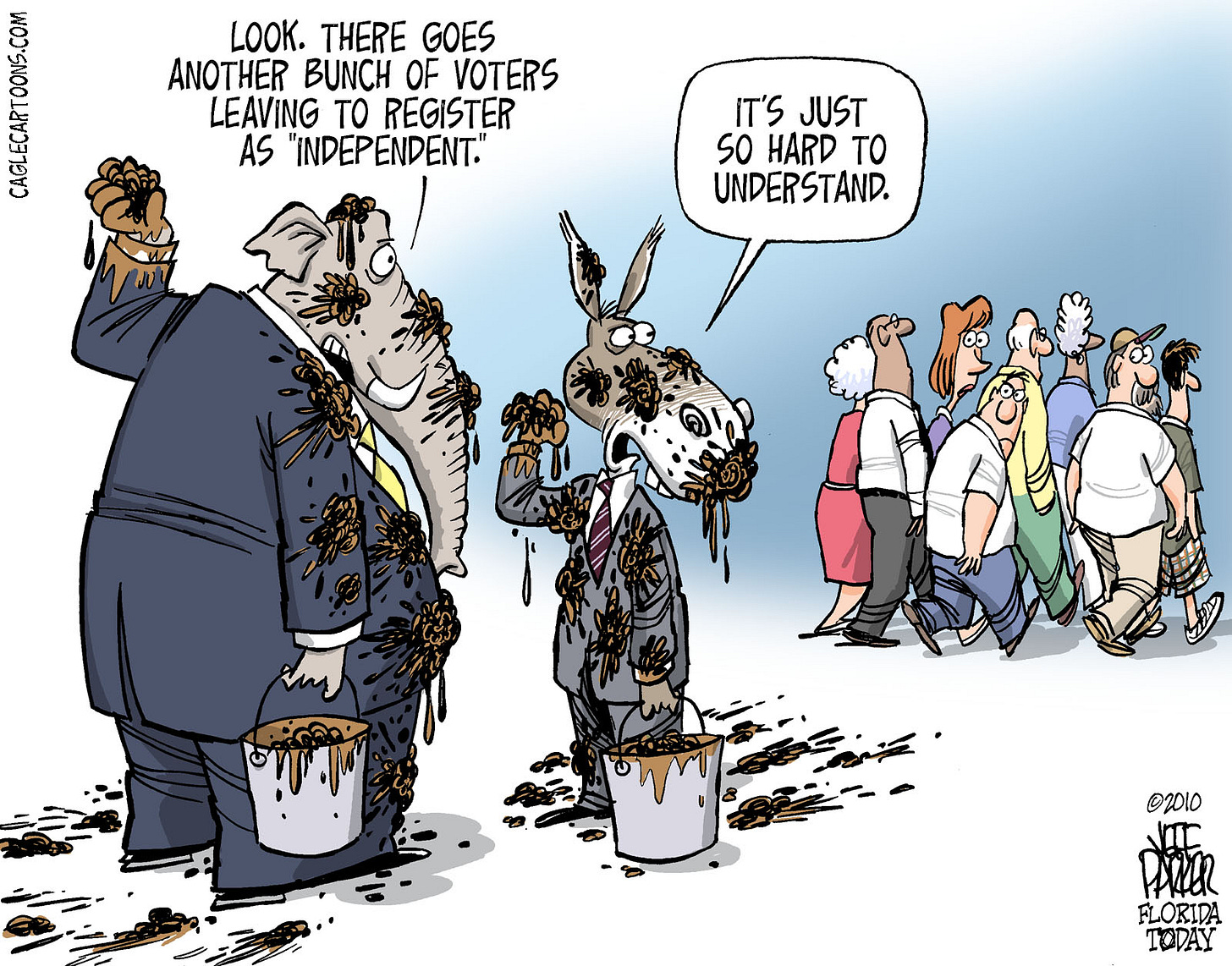More and more Americans are declaring their independence from the 2-party political system. The number of Independent, or unaffiliated, voters has grown in recent years to the point that there are more independent voters than voters registered with either of the 2 major parties.
It isn’t hard to see why. Rather than strive for “big tents” the two old parties cater to their bases in elections increasingly won and lost at the primary level. There’s no room in the Republican Party for supporters of civil rights. There’s no room in the Democratic Party for proponents of small government. Yet we are constantly bombarded with the message that these are the only two viable parties. As Hoover Institute Fellow, Morris Fiorina, said in his recent OpEd, “if a citizen favors lower taxes and less regulation, why should she have to support restricting abortion, or vice versa? Those are the kinds of restricted choices the two parties offer.”
Stories in the media often highlight extreme polarization, with a focus on extreme partisans, framing them as “typical” American voters. These stories sell newspapers, get web clicks, and support cable channels, despite the fact that this narrative is patently false. In his meticulously sourced book, Unstable Majorities, Fiorina makes the case that on most policies, the majority of Americans actually agree with each other.
I know one thing most on which Americans agree: the most likely 2024 presidential candidates stink. A survey of 26,000 registered voters found that 62% did not want Trump to run again, and 69% did not want Biden to run. So much for the pretense that parties listen to voters. And voters are not blind to this.
Public disdain for the two old political parties has been growing, however. “In 1994, just 6% of the public had an unfavorable view of the Republican and Democratic parties. Today, about a quarter (27%) have negative views of both parties. This view is especially pronounced among partisan leaners: 44% of Republican-leaning independents – and an identical share of Democratic leaners – currently have negative views of both parties (Pew Researc.org).”
To defend themselves to constituents who are unhappy with the two parties, members of congress lament that they have to follow the dictates of party leaders. If they don’t the evil that is the other side will surely prevail. They argue they have no choice, even when they believe the policies they are supporting are wrong. There is, however, a choice. They could choose to stand by their principles, to express independent thought. Of course, this may result in lost committee positions, and lost financial support. They may lose their next election. Being dictated by fear of those consequences is no way to represent your constituency.
There are a few who have taken this road. Most have been drummed out of their committees or out of congress entirely. Over the course of the past year, we have seen at least one Senator take advantage of the close head count in congress to buck party leaders. Unwilling to toe the party line, Senator Manchin was able to alter major policy initiatives, forcing parties and the president to compromise their positions. Having a tie-breaking power did not change the minds of the party elites, but it earned the respect of voters who want their representative to stand up for principles.
With all of this displeasure with the direction of the two old parties, one would expect their grip on power to loosen. Certainly, there are alternative political parties. There are Libertarian and Green, Pirate and Keystone. New parties, in an effort to move away from the shrinking old parties, have emerged as well. Andrew Yang’s Forward Party and the No Labels Party are two examples. The main thing all these parties have in common is that they are not Republicans or Democrats.
Increasingly, voters are registering as Independent, eschewing any party affiliation. They may lean slightly left or right, but agree with each other far more than they disagree. They also tend to think less of the quality of candidates than the parties they lean towards.
These growing ranks of unaffiliated voters want to see common-sense change in their government. As I found out quickly during my third party 2020 run for Congress, the major parties deftly use their position to minimize the power of independent and small party voters. They paint a picture of every non-R or D candidate as un-electable and tell the horror story of thrown away votes that could cost an election.
If you are running for office at any level, and are not an endorsed Dem or GOP candidate, you have little chance of proving to the voters that you are electable. The hurdles to get your name on the ballot are high. You are blocked from the debate stage and struggle for the same level of media coverage given to the prom queen and her court.
To make matters worse, in many states, like Pennsylvania, unaffiliated voters and 3rd party voters can’t participate in primary elections unless there is a local referendum. This means these voters have no voice in choosing the candidates for the General Election. This is because primary elections are not part of the local government process at all. They are voting systems that use taxpayer dollars to support private, non-governmental entities, namely the Republicans and Democrats. So, third party and unaffiliated voters get to pay taxes that support these private parties, but don’t get to participate in the process you are paying for. Someone should come up with a clever term for this financial injustice. I know, how about, “taxation without representation’? (No, it will probably never catch on.)
Maybe it is time for all of us to declare our independence. As the voting roles swell with Americans who do not belong to the two old (or any) parties, the top-down policies of the Democrats and Republican leadership’s lose significance. They may be forced to (horrors!) pay attention to what the American public cares about.
As we celebrate our country’s birthday this July, perhaps it is time for more of us to start our own personal Declarations of Independence by leaving these old, tired political parties, turning our back on their self-serving propaganda, and supporting candidates who better reflect our values.
In the meantime, Happy Birthday!









Fact is, the 1% seems to be hoarding, say, $50T these days. https://time.com/5888024/50-trillion-income-inequality-america/
That would seemingly cover the national debt and leave a few shekles left over for, say, social programs. Any candidate from any party, or independent, unwilling to adderss and debate how to fix this is kind of useless, IMHO.